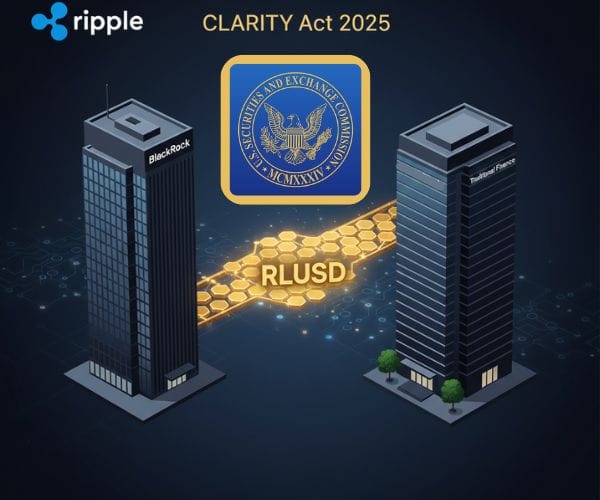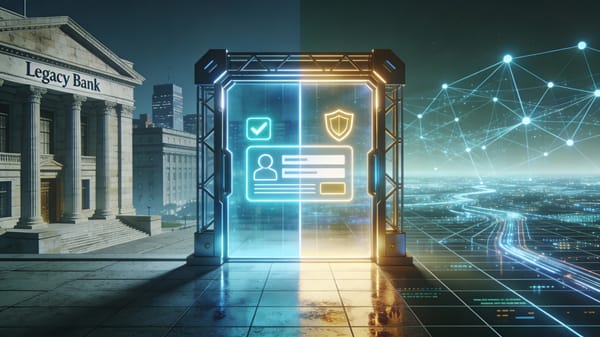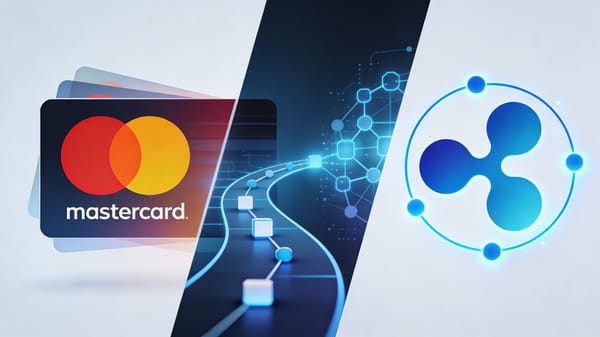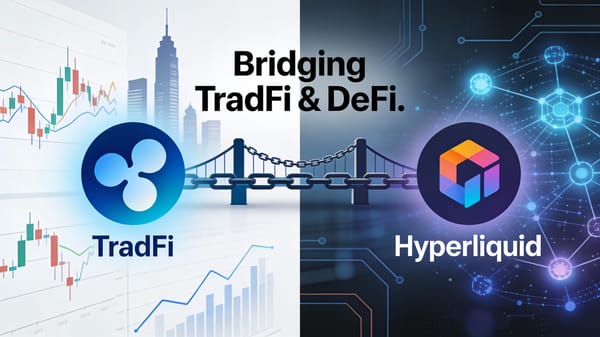BlackRock's XRP Pivot: How Ripple's RLUSD Partnership Changes Everything as CLARITY Act Nears Passage
BlackRock REVERSES XRP stance! After claiming "no plans," their $2B BUIDL fund now offers 24/7 RLUSD redemptions via Securitize. Carlos Domingo: "Major step forward in automating liquidity." Perfect timing as CLARITY Act nears passage. Game changer for XRP.

The financial world just witnessed a seismic shift. BlackRock, the asset management giant that previously showed little interest in XRP, has now officially partnered with Ripple through a groundbreaking RLUSD integration—and the timing couldn't be more significant.
Very excited to share that @BlackRock’s $BUIDL and @VanEck_US’s $VBILL tokenized fund holders can redeem shares for RLUSD/ETH 24/7 365 through @Securitize, and soon to come RLUSD/XRPL.
— Brad Garlinghouse (@bgarlinghouse) September 23, 2025
Enterprise-grade instant onchain liquidity at your fingertips. That’s real utility.…
On September 23, 2025, Ripple CEO Brad Garlinghouse announced that BlackRock's $2 billion USD Institutional Digital Liquidity Fund (BUIDL) and VanEck's $74 million Treasury Fund (VBILL) would support instant 24/7 redemptions through Ripple's RLUSD stablecoin via Securitize. This marks a dramatic reversal for BlackRock, which had repeatedly stated it had "no plans" to launch XRP-related products, and comes at a pivotal moment as the CLARITY Act awaits Senate passage following landmark crypto legislation that has already reshaped the U.S. regulatory landscape.
How do you unlock real-time liquidity for institutional assets? With $RLUSD. https://t.co/2TvkEmSKTk
— Ripple (@Ripple) September 23, 2025
Our new partnership with @Securitize will allow holders of @BlackRock's $BUIDL and @VanEck_US's $VBILL to instantly exchange their shares for $RLUSD, thereby preserving exposure…
BlackRock's Previous XRP Resistance
Until now, BlackRock's relationship with XRP has been notably distant. As recently as August 2025, the firm explicitly ruled out launching spot ETFs for XRP or Solana, despite managing successful Bitcoin and Ethereum ETFs worth billions. The company's stance was clear: client interest outside Bitcoin and Ethereum remained minimal.
This cautious approach stood in stark contrast to competitors like Grayscale, Bitwise, and VanEck, who had already filed XRP ETF applications with the SEC. ETF analyst Eric Balchunas suggested BlackRock was "happy with the two" existing crypto ETFs, citing diminishing returns from expanding their offering.
Even BlackRock's participation in Ripple's Swell 2025 conference—where Maxwell Stein, Director of Digital Assets, is scheduled to speak—was met with skepticism. The firm maintained it had "no immediate plans for an XRP ETF" despite growing speculation from the crypto community.
The RLUSD Integration: A Strategic Reversal
Tuesday's announcement represents a fundamental shift in BlackRock's approach to XRP-ecosystem assets. By integrating RLUSD as an off-ramp for their tokenized funds, BlackRock has essentially validated Ripple's institutional infrastructure and regulatory compliance.
The Regulatory Licensing Advantage: Why This Choice Matters
Market analyst WrathofKahneman provides a critical insight into an often-overlooked aspect of this partnership: "Securitize is one of few fully licensed securities/token platforms. If it were in Ripple's tech stack, they'd have licensed securities w/ #RLUSD, custody & payments. Circle doesn't."
Speculation: There’s a lot to unpack in the Ripple/BlackRock/VanEck news, but here’s another angle: Securitize is one of few fully licensed securities/token platforms. If it were in Ripple's tech stack, they'd have licensed securities w/ #RLUSD, custody, & payments. Circle…
— WrathofKahneman (@WKahneman) September 23, 2025
This observation reveals a strategic advantage that extends far beyond simple stablecoin integration. While Circle operates USDC under various money transmitter licenses and regulatory approvals, it is not a registered broker-dealer or securities platform. Securitize, however, operates as a fully licensed and regulated SEC-registered broker-dealer, FINRA member, and SEC-regulated Alternative Trading System (ATS).
The Licensing Implications:
- Securities Infrastructure: Securitize can legally facilitate trading of tokenized securities, not just payment tokens
- Institutional Custody: Full broker-dealer capabilities for enterprise-grade asset custody
- Regulatory Compliance: ATS registration enables compliant secondary trading of digital asset securities
- Competitive Edge: RLUSD now has access to licensed securities infrastructure that USDC lacks
This regulatory positioning becomes even more significant considering that BlackRock led Securitize's $47 million funding round in May 2024, with BlackRock's Joseph Chalom joining Securitize's Board of Directors. BlackRock's deep investment in Securitize's licensed infrastructure provides a direct pathway for RLUSD to access securities-grade compliance that other stablecoins cannot offer.
Securitize: The Licensed Platform That Changes Everything
Securitize's role in this partnership cannot be understated. As a regulated tokenization platform overseeing over $4 billion in tokenized real-world assets, Securitize operates as a broker-dealer registered with the SEC and is a member of FINRA and SIPC. The platform facilitates trading of digital asset securities through its Alternative Trading System (ATS) and maintains good standing with regulators.
BlackRock’s BUIDL is setting the benchmark for onchain finance as the largest tokenized fund in the world.
— Securitize (@Securitize) September 2, 2025
Tokenized by Securitize, BUIDL has now paid over $70M in dividends since launch, including $8.3M in August alone.
BUIDL brings institutional size onchain, with daily… pic.twitter.com/uwVnSTsDdz
This integration marks the first time RLUSD has been added to Securitize's tokenization platform, with "additional use cases and assets planned" for future expansion. Most significantly, Securitize is also moving to integrate with the XRP Ledger (XRPL), expanding liquidity channels and creating new utilities for RLUSD in the XRPL ecosystem.
The platform's credibility as a bridge between traditional finance and blockchain is evidenced by its client roster, which includes major asset managers like BlackRock, VanEck, KKR, and Apollo. With BlackRock's BUIDL growing from zero to over $2 billion in assets within just over a year, and VanEck's VBILL managing $74 million across multiple blockchains, these tokenized funds represent the cutting edge of institutional digital asset adoption.
We’re partnering with @Ripple to enable RLUSD transfers for @Blackrock’s BUIDL and @vaneck_us’s VBILL tokenized funds.
— Securitize (@Securitize) September 23, 2025
BUIDL & VBILL, two of the largest tokenized Treasury funds gain 24/7 instant exchange via RLUSD, powered by Securitize. pic.twitter.com/Kg5i0VuyKk
Partnership Infrastructure and Capabilities:
- Instant liquidity: BUIDL and VBILL holders can exchange shares for RLUSD 24/7 without traditional banking restrictions
- Regulatory clarity: RLUSD operates under a New York Department of Financial Services trust charter
- Enterprise-grade functionality: Real-time settlement and programmable liquidity for institutional investors
- DeFi bridge: Access to on-chain yield strategies while maintaining compliance
- Cross-chain capabilities: Securitize selected Wormhole as its official interoperability provider for all tokenized assets, enabling seamless cross-chain transfers
- Institutional custody: Full broker-dealer services for enterprise-grade asset management
Securitize's Competitive Moat:
What sets Securitize apart from other platforms is its comprehensive regulatory framework that few competitors can match. The platform operates multiple regulated entities: Securitize, Inc. as the technology provider, Securitize Markets as the SEC-registered broker-dealer, and Securitize Capital as an exempt reporting adviser. This multi-layered approach provides the regulatory coverage necessary for institutional clients who require full compliance across all aspects of digital asset operations.
The significance of BlackRock's involvement extends beyond just using Securitize's platform. BlackRock led Securitize's $47 million strategic funding round in May 2024, with BlackRock's Global Head of Strategic Ecosystem Partnerships, Joseph Chalom, joining Securitize's board of directors. This level of strategic investment and governance involvement demonstrates BlackRock's commitment to Securitize's vision of tokenizing traditional finance.
Market Leadership and Scale:
Securitize has established itself as the clear leader in institutional tokenization, with approximately 3,000 clients representing 1.2 million investors combined. The platform's growth trajectory is remarkable—tokenized real-world assets on Securitize have accumulated to about $4 billion, making it a critical hub for institutional tokenization.
This scale advantage becomes even more significant when considering the broader tokenized asset market. According to RWA.xyz, total tokenized assets have reached $30.3 billion globally as of 2025, with Securitize controlling a substantial portion of this market. BlackRock and VanEck's tokenized funds are considered bellwethers for institutional adoption, and their integration with RLUSD through Securitize signals broader market acceptance of Ripple's institutional infrastructure.
- Instant liquidity: BUIDL and VBILL holders can exchange shares for RLUSD 24/7 without traditional banking restrictions
- Regulatory clarity: RLUSD operates under a New York Department of Financial Services trust charter
- Enterprise-grade functionality: Real-time settlement and programmable liquidity for institutional investors
- DeFi bridge: Access to on-chain yield strategies while maintaining compliance
Jack McDonald, Ripple's Senior Vice President of Stablecoins, called this "a natural next step as we continue to bridge traditional finance and crypto," emphasizing RLUSD's design for institutional use with regulatory clarity and stability.
Perfect Timing: GENIUS Act Passed, CLARITY Act Advancing
The timing of BlackRock's RLUSD integration is no coincidence. On July 18, 2025, President Trump signed the GENIUS Act into law, establishing the first federal regulatory framework for payment stablecoins in U.S. history. Meanwhile, the CLARITY Act passed the House with strong bipartisan support (294-134) and now awaits Senate consideration, promising to provide the final piece of regulatory clarity that institutions like BlackRock have been waiting for.
The CLARITY Act's Critical Impact:
The CLARITY Act, which passed the House 294-134, represents the final piece of the regulatory puzzle. This comprehensive market structure bill would:
- Transfer regulatory jurisdiction for most digital assets from SEC to CFTC oversight
- Define "digital commodities" as assets operating on sufficiently decentralized blockchains
- Classify Bitcoin and likely Ethereum as digital commodities under CFTC jurisdiction
- Provide clear pathways for newer projects to achieve commodity status through decentralization or transparency
- Exempt qualifying digital commodities from Securities Act requirements
Senate Banking Committee Chair Tim Scott stated he wants the Senate to advance market structure legislation by September 30, 2025, using the House's CLARITY Act as a "strong template". This timeline suggests final passage could occur within weeks of BlackRock's RLUSD announcement.
Dante Disparte of Circle noted the legislation "sends a clear message that the U.S. will lead in the regulation of dollar-backed payment stablecoins," providing the institutional confidence BlackRock required.
The Broader Legislative Context
The GENIUS Act was part of "Crypto Week 2025," which saw passage of three major bills:
1. The CLARITY Act (passed House 294-134): Establishes clear regulatory frameworks for digital assets, transferring jurisdiction from SEC to CFTC for many cryptocurrencies
2. The Anti-CBDC Surveillance State Act (passed House 219-210): Prohibits Federal Reserve from issuing central bank digital currencies without congressional approval
3. Future Market Structure Bills: Senate Banking Committee Chair Tim Scott aims to advance comprehensive market structure legislation by September 30, 2025
This regulatory clarity removes the primary obstacle that kept institutional players like BlackRock on the sidelines. House Financial Services Committee Chairman French Hill called this "the pivotal moment for American innovation" in digital asset regulation.
XRP's New Institutional Pathway
The BlackRock partnership fundamentally changes XRP's institutional adoption trajectory. Here's why:
Validation Effect: BlackRock's decision to work with Ripple's RLUSD legitimizes the broader XRP ecosystem for other institutional players who follow BlackRock's lead.
Network Effects: As RLUSD expands to XRP Ledger, announced as "coming soon," increased network activity will generate XRP transaction fees and potentially reduce circulating supply through fee burning.
Competitive Pressure: ETF analyst Nate Geraci argues BlackRock "won't stop at Bitcoin and Ethereum," pointing to XRP and Solana as logical next steps, especially given the regulatory clarity now in place.
Regulatory Precedent: With RLUSD operating under federal oversight and BlackRock's endorsement, the path for XRP ETF approval becomes significantly clearer.
Market Implications and Price Catalysts
Several factors suggest this partnership could drive significant XRP price appreciation:
Institutional FOMO: As one analyst noted, if BlackRock moves for an XRP ETF filing, it could bring faster approval processes given BlackRock's nearly 100% ETF approval rate.
Supply Dynamics: Current data shows RLUSD has $616 million supply on Ethereum versus $85 million on XRP Ledger, indicating massive growth potential as integration expands.
Utility Growth: RLUSD's $740 million market cap and institutional adoption creates genuine utility for XRP as the native asset of the network.
Regulatory Momentum: With the CLARITY Act expected to pass the Senate by September 30, 2025, XRP could benefit from being classified as a digital commodity under CFTC oversight rather than remaining in the SEC's regulatory gray area.
The Competitive Landscape Shifts
BlackRock's embrace of RLUSD positions Ripple to compete directly with established stablecoins like USDC and USDT in the institutional market. Securitize, which oversees over $4 billion in tokenized assets, called the partnership "a major step forward in automating liquidity for tokenized assets".
This development also validates President Trump's vision of making the U.S. "the crypto capital of the planet." The administration's active support for crypto legislation, combined with industry engagement through lobbying and advocacy, has clearly borne fruit.
What This Means for XRP Investors
The BlackRock-Ripple partnership represents more than institutional validation—it's a fundamental shift in how traditional finance views the XRP ecosystem:
- Regulatory Risk Removed: Federal legislation provides the clarity institutional investors demanded
- Infrastructure Validation: BlackRock's endorsement signals enterprise-ready technology
- Competitive Positioning: Ripple gains ground against other stablecoin providers
- Network Growth: RLUSD adoption drives utility for XRP as the native network asset
- ETF Pathway: Clear regulatory framework enables potential XRP ETF development
As crypto analyst Anderson suggests, "BlackRock's appearance at Ripple Swell 2025 alongside this partnership integration could signal an XRP ETF announcement is imminent", especially with Ripple's legal clarity and shifting regulatory climate.
Conclusion: A New Chapter for Institutional Crypto
BlackRock's integration with Ripple's RLUSD marks a watershed moment—not just for XRP, but for the entire crypto industry. After years of regulatory uncertainty and institutional hesitation, the combination of landmark federal legislation and BlackRock's validation creates a fundamentally new landscape for digital asset adoption.
For XRP holders, this development validates the long-term vision of the XRP Ledger as enterprise-grade financial infrastructure. The regulatory clarity provided by the GENIUS Act, combined with BlackRock's institutional endorsement, removes the primary barriers that have limited XRP's institutional adoption.
As the crypto industry enters this new era of regulatory clarity and institutional acceptance, Ripple and XRP appear positioned to capture significant market share in the intersection of traditional finance and blockchain technology. The question is no longer whether institutions will embrace crypto—it's how quickly they'll move to capture the opportunities this new framework provides.
The partnership announcement by Brad Garlinghouse wasn't just about RLUSD redemptions. It was BlackRock's quiet acknowledgment that the future of institutional finance includes XRP, whether they're ready to admit it publicly or not.
Sources:
- The Block: Securitize launches offramp for BlackRock's BUIDL and VanEck's VBILL
- Latham & Watkins: The GENIUS Act of 2025
- BeInCrypto: BlackRock Wants Nothing To Do With XRP
- Atlantic Council: Four questions on new US cryptocurrency legislation
- Cointelegraph: Ripple stablecoin added as off-ramp for BlackRock and VanEck
DISCLAIMER: This newsletter is for informational purposes only and does not constitute investment advice, advertising, or a recommendation to buy, sell, or hold any securities. This content is not sponsored by or affiliated with any of the mentioned entities. Investments in cryptocurrencies or other financial assets carry significant risks, including the potential for total loss, extreme volatility, and regulatory uncertainty. Past performance is not indicative of future results. Always consult a qualified financial professional and conduct thorough research before making any investment decisions.



